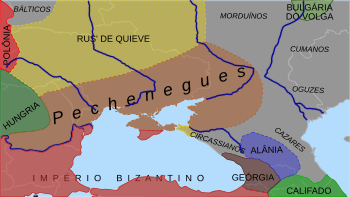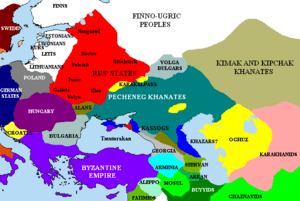Pechenegs facts for kids
Quick facts for kids
Pecheneg Khanates
|
|||||||||
|---|---|---|---|---|---|---|---|---|---|
| 860–1091 | |||||||||

Pecheneg Khanates and neighboring territories, c.1030
|
|||||||||
| Status | Khanate | ||||||||
| Common languages | Pecheneg | ||||||||
| History | |||||||||
|
• Established
|
860 | ||||||||
|
• Disestablished
|
1091 | ||||||||
|
|||||||||

The Pechenegs were a group of people who lived a nomadic life, meaning they moved around a lot instead of settling in one place. They were part of the Turkic peoples and spoke a language called Pecheneg. They lived in the vast grasslands, or steppes, of Central Asia and Eastern Europe for many years.
Contents
Who Were the Pechenegs?
The Pechenegs were a strong and brave group of people. They were known for their skills as horse riders and warriors. Their way of life was centered around moving with their herds of animals across the wide-open plains. They lived in groups called "khanates," which were like small kingdoms led by a chief called a Khan.
Life on the Steppe
Life for the Pechenegs was all about movement. They lived in portable tents and traveled with their families and animals. Their main activities included hunting, raising livestock, and trading with other groups. Because they were always on the move, they became very skilled at riding horses and fighting from horseback. This made them powerful warriors.
Where Did They Live?
The Pechenegs originally came from Central Asia. Over time, they moved west into the steppes of Eastern Europe. This area is now parts of countries like Ukraine, Moldova, and Romania. They often lived near important rivers like the Dnieper and Danube. Their location meant they were often neighbors with powerful empires and kingdoms.
Pechenegs and Their Neighbors
The Pechenegs had many interactions with the groups around them. Sometimes they were allies, helping each other in battles or trading goods. Other times, they were enemies, raiding each other's lands.
The Byzantine Empire
The Byzantine Empire was a very powerful empire in the south, centered around the city of Constantinople (modern-day Istanbul). The Pechenegs often had dealings with the Byzantines. Sometimes the Byzantines would pay the Pechenegs to protect their borders or to fight against other enemies. Other times, the Pechenegs would raid Byzantine lands, causing trouble.
Kievan Rus'
To the north, the Pechenegs interacted a lot with Kievan Rus', which was an early East Slavic state. The Pechenegs often fought with the Rus' princes, especially over trade routes along the rivers. There were many battles, but also periods of peace and alliances. For example, Pecheneg warriors sometimes joined Rus' armies in their campaigns.
What Happened to the Pechenegs?
By the 11th century, the Pechenegs faced new challenges. Other nomadic groups, like the Kipchaks, began to move into their territories. They also suffered defeats in battles against the Byzantine Empire and Kievan Rus'. Over time, many Pechenegs were defeated, absorbed into other groups, or settled down and lost their distinct nomadic identity. By the end of the 11th century, they were no longer a major power in the region.
Images for kids
-
Map of Southeastern Europe, c. 1040–70. Pechenegs are called by the alternate name Patzinaks.
-
The Pechenegs slaughter the "Scyths" of Sviatoslav I of Kiev.
See also
 In Spanish: Pechenego para niños
In Spanish: Pechenego para niños
 | Jackie Robinson |
 | Jack Johnson |
 | Althea Gibson |
 | Arthur Ashe |
 | Muhammad Ali |




